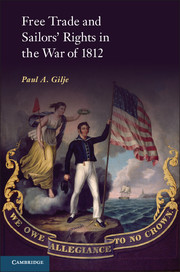Part Four - War
Published online by Cambridge University Press: 05 March 2013
Summary
War
As we have seen, both high and low cultural threads came together and were woven into the pennant placed aboard the Essex as it headed to sea in 1812. From that point forward the political slogan gained a life of its own. The rest of the American navy quickly adopted the motto. A series of surprising American triumphs at sea only strengthened the appeal of free trade and sailors’ rights. Porter and the Essex also added luster to the phrase by sailing to the Pacific and decimating the British whaling fleet. Even in defeat at the Battle of Valparaiso, Porter and his crew enhanced the appeal of the rallying cry. The war on land produced some language of combat that augmented Porter's motto, but did not replace it. Slogans like “Don't give up the ship” and “We have met the enemy and they are ours” have become a part of American folklore, and Francis Scott Key's poem “Defence of Fort McHenry” later became the lyrics of the national anthem under the title “The Star Spangled Banner.” Yet for the generation who fought the War of 1812, free trade and sailors’ rights retained its special appeal. Within months of the opening of the war politicians were using the phrase in speeches in the halls of Congress to summarize the war aims. And even when the exact words were not used, every time politicians had to explain the war they depended upon the basic concepts expressed by the phrase. Both Republicans and Federalists relied on its rhetoric to defend or attack the war. The ideals of free trade and sailors’ rights fared less well in diplomacy. Although the British had ceded some ground on free trade by repealing the orders of council as the war commenced, American insistence on British concessions on the issue of impressment helped to prolong the war.
- Type
- Chapter
- Information
- Free Trade and Sailors' Rights in the War of 1812 , pp. 197 - 198Publisher: Cambridge University PressPrint publication year: 2013



